WASHINGTON (AP) — Health care has emerged as a pivotal issue during the ongoing U.S. government shutdown, with Democrats advocating for an extension of subsidies linked to the Affordable Care Act (ACA). These subsidies, initially increased during the COVID-19 pandemic, are vital for the affordability of insurance plans for millions. As Congress grapples with the shutdown, some Republicans express willingness to extend these subsidies, though many others oppose any such moves.
In a letter to fellow Republicans, Texas Rep. Chip Roy emphasized the need for the GOP to act decisively, warning that failure to capitalize on the situation could lead to political repercussions. If Republicans govern by poll and fail to grab this moment, they will own it, he stated.
Despite past Republican efforts to dismantle the ACA, enrollment has surged to a record 24 million, largely due to subsidized plans making health coverage more accessible. As the shutdown stretches into its seventh day, the debate over health care policy complicates negotiations to reopen the government, frustrating federal workers who remain unpaid.
Former President Donald Trump has weighed in, stating, I am happy to work with Democrats on their Failed Healthcare Policies, or anything else, but first they must allow our Government to reopen. Trump's comments highlight the pressure to resolve the stalemate, though he initially suggested ongoing negotiations were possible.
Senate Majority Leader John Thune indicated a potential path for a compromise exists, contingent upon Democrats reopening the government, suggesting that any agreement would likely hinge upon the White House's stance. Some GOP senators, however, insist that the fundamental issue lies with Obamacare itself, with a call for restructuring the health care law rather than merely extending its subsidies.
Public sentiment seems to favor Democrats, particularly as affected constituents prepare for soaring premium costs. Senate leaders on both sides remain at odds, even as some rank-and-file members have initiated private discussions aimed at reaching a solution. Proposals have emerged, including a temporary extension of subsidies, yet achieving consensus remains challenging.
As the impasse continues, some Republicans are considering a pragmatic approach to health care in response to the immediate costs facing voters. The unfolding situation underscores the broader implications of health care policy in American politics, particularly within the context of the ongoing government shutdown.




















